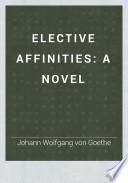Quotes from book
Elective Affinities

Elective Affinities , also translated under the title Kindred by Choice, is the third novel by Johann Wolfgang von Goethe, published in 1809. The title is taken from a scientific term once used to describe the tendency of chemical species to combine with certain substances or species in preference to others. The novel is based on the metaphor of human passions being governed or regulated by the laws of chemical affinity, and examines whether or not the science and laws of chemistry undermine or uphold the institution of marriage, as well as other human social relations.

“One is never satisfied with a portrait of a person that one knows.”
Bk. II, Ch. 2
Elective Affinities (1809)

“No one would talk much in society, if he knew how often he misunderstands others.”
Bk. II, Ch. 4
Elective Affinities (1809)

Dem Reichen übergibt der Baumeister mit dem Schlüssel des Palastes alle Bequemlichkeit und Behäbigkeit, ohne irgend etwas davon mitzugenießen. Muß sich nicht allgemach auf diese Weise die Kunst von dem Künstler entfernen, wenn das Werk wie ein ausgestattetes Kind nicht mehr auf den Vater zurückwirkt? Und wie sehr mußte die Kunst sich selbst befördern, als sie fast allein mit dem öffentlichen, mit dem, was allen und also auch dem Künstler gehörte, sich zu beschäftigen bestimmt war!
Bk. II, Ch. 3, R. J. Hollingdale, trans. (1971), p. 170
Elective Affinities (1809)

“There are occasions … when all consolation is base and it is a duty to despair.”
Es gibt Fälle, ... wo jeder Trost niederträchtig und Verzweiflung Pflicht ist.
Bk. I, Ch. 18, R. J. Hollingdale, trans. (1971), p. 147
Elective Affinities (1809)

“None are more hopelessly enslaved than those who falsely believe they are free.”
Niemand ist mehr Sklave, als der sich für frei hält, ohne es zu sein.
Bk. II, Ch. 5; source: Die Wahlverwandtschaften, Hamburger Ausgabe, Bd. 6 (Romane und Novellen I), dtv Verlag, München, 1982, p. 397 (II.5)
Elective Affinities (1809)